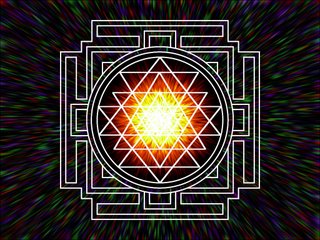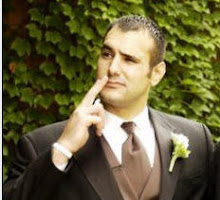
Man's Desire for Money and Power: A Natural Gravitation?
The question is interesting and profound. My wife, incredible woman and genius she is, asked me what my thoughts were on this very question yesterday while on our walk. I wanted to answer definitely and with no room for argument, the one which I always feel around me when I envision and observe people and their behaviors, but I wanted to think about this too. I am not proud to say I have not thought any more about it; however, I am willing to lay out the argument as I see it here before you, to the reader and my lovely wife, so it may be picked apart and your own conclusions can be formed. Perhaps we may start a dialogue and arrive at some compromise or conclusion, though those of you who took notes on the last week, would know that no matter what we conclude, there is no single answer which can satisfy the meaning we are deliberately trying to make.
But before we begin, I would like to make mention of the image at the top of the page. For any of you out there that actually knew what that symbol was, I’m proud of you. For those of you who thought I would put up a senseless image which bore no relevancy to our discussion, shame on you. The image is called Mandala. Here is the definition, which may or may not be correct as I have to take this website’s word for it. www.mandala-universe.com
But before we begin, I would like to make mention of the image at the top of the page. For any of you out there that actually knew what that symbol was, I’m proud of you. For those of you who thought I would put up a senseless image which bore no relevancy to our discussion, shame on you. The image is called Mandala. Here is the definition, which may or may not be correct as I have to take this website’s word for it. www.mandala-universe.com
“Mandala in Sanskrit means sacred circle. The use of mandalas is rooted in historical practices from many different spiritual traditions. Mandala traditions are derived from direct experience of truth and have always been used as a means of turning inward to investigate the mind and to discover the inner truth about our essential nature.” (Emphasis mine)
Additionally, there is a second meaning, also intimately mystic and mysterious and bound to the nature of self-discovery which has to be represented here although, it must be noted, I chose this symbol for its first meaning, this unfortunately came along with it, though it still can hold water to the theme of this topic, it is certainly on another level.
"In the Indian Hindu Tantric tradition, the Mandala symbol for enlightenment and ultimate healing is called the SRI YANTRA. SRI YANTRA represents the unfolding of the universe both within you and without. These two processes—the inner journey and the outward unfolding—alternate eternally in a process known as manifest-unmanifest, or the entire creative process consisting of emanation, dissolution, absorption, and then emanation again.
SRI YANTRA, a revealed symbol, is the frozen mantra vibratory pattern created when the sacred sound of Aum is properly intoned by a yogi. AUM as atomic vibration is the active sound principle of creation, which brings thought into form through vibration. At another level Sri Yantra represents the return to one's center---through the star gate of the spiritual eye into silent source--- Absolute Consciousness or Beingness. "
(Note if you have trouble reading this portion, please enlarge the text on your browser: go to “View”, go to “Text Size”.)
On with the show. The question: does Man naturally gravitate toward money and power? Here is how I will answer this question: no, I do not believe Man (women and men), just so we are not confused whom I am speaking about, because, and this is a slight digression from the point, this world is still quite patriarchal, whether we choose to believe this or not, and do want this question to be viewed as only pertaining to men, since it is still the dominant perception that Men will be the ones to accumulate the tangible money and the intangible power, naturally gravitate toward and attempt to accumulate money and power.
Reasons: Money and Power are socially constructed ideals and artifacts, and because of this, after centuries and centuries of “Social Darwinism”, that is, those who followed the trend survived and reproduced, these social constructs became the key to survival and goal. Look here’s the thing: there is no single point in time we, in this case I mean “I” because I am not nearly smart enough to know everything about everything, can isolate to illustrate this was the magical revolution in human psychological evolution. What I can offer as evidence is Jean-Jacques Rousseau’s “Discourse on the Origin of Inequality”. Rousseau offer hundreds of complex scenarios in this discourse, but ultimately, within the first pages of his argument offers his explanation: the moment someone claimed, ‘this is mine’, is the moment inequality started. There was a have and a have not. Inequality. When this occurred, who knows? But, if you really want to be honest about it, it is this point which set forth in motion the desperate chase for money and power among Man.
My contention is these are learned behaviors and social mechanisms, as the advent of inequality blossomed into greater social institutions, such as placing value on items, a barter and trade system, kingdoms, chiefdoms, hierarchies of power. Along the way there had to have been an individual not blessed by nature, as there lies Man’s first inequality, our genetics, who decided the only way to level the playing field is to accumulate “possessions” and obtain these possessions through an item which would carry value. The argument from here on out becomes muddled and over-wrought with scenarios: strong vs. weak, intelligent vs. not-intelligent, eventually leading us to the argument institutionalism vs. Nature.
My point may be muddled, so I will put it squarely out there: Nature starts inequality in men, this cannot be helped and is taken as a given, as our base. However, I believe Man works in unison to achieve survival, converging and optimizing all talents, strengths, and weaknesses. Since “power” and “money” are constructed ideals of Man, as to their ever-shifting meanings and what these things constitute, they are inherently learned behaviors in societies. At one point there was an individual who constructed different ideals of “survival” and equated this with possessions. There starts the inequality we know today. The moment someone said, “This is mine.” Man then begins to create societies which balance the new equation of possessions = power. And we snowball further and further.
I am interested in anyone’s point of view on this question: does Man naturally gravitate toward money and power? I have offered my hypothesis to you. You can choose to accept or not.
Reasons: Money and Power are socially constructed ideals and artifacts, and because of this, after centuries and centuries of “Social Darwinism”, that is, those who followed the trend survived and reproduced, these social constructs became the key to survival and goal. Look here’s the thing: there is no single point in time we, in this case I mean “I” because I am not nearly smart enough to know everything about everything, can isolate to illustrate this was the magical revolution in human psychological evolution. What I can offer as evidence is Jean-Jacques Rousseau’s “Discourse on the Origin of Inequality”. Rousseau offer hundreds of complex scenarios in this discourse, but ultimately, within the first pages of his argument offers his explanation: the moment someone claimed, ‘this is mine’, is the moment inequality started. There was a have and a have not. Inequality. When this occurred, who knows? But, if you really want to be honest about it, it is this point which set forth in motion the desperate chase for money and power among Man.
My contention is these are learned behaviors and social mechanisms, as the advent of inequality blossomed into greater social institutions, such as placing value on items, a barter and trade system, kingdoms, chiefdoms, hierarchies of power. Along the way there had to have been an individual not blessed by nature, as there lies Man’s first inequality, our genetics, who decided the only way to level the playing field is to accumulate “possessions” and obtain these possessions through an item which would carry value. The argument from here on out becomes muddled and over-wrought with scenarios: strong vs. weak, intelligent vs. not-intelligent, eventually leading us to the argument institutionalism vs. Nature.
My point may be muddled, so I will put it squarely out there: Nature starts inequality in men, this cannot be helped and is taken as a given, as our base. However, I believe Man works in unison to achieve survival, converging and optimizing all talents, strengths, and weaknesses. Since “power” and “money” are constructed ideals of Man, as to their ever-shifting meanings and what these things constitute, they are inherently learned behaviors in societies. At one point there was an individual who constructed different ideals of “survival” and equated this with possessions. There starts the inequality we know today. The moment someone said, “This is mine.” Man then begins to create societies which balance the new equation of possessions = power. And we snowball further and further.
I am interested in anyone’s point of view on this question: does Man naturally gravitate toward money and power? I have offered my hypothesis to you. You can choose to accept or not.
